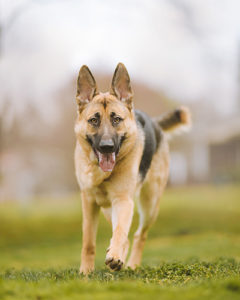Dog Health Issues by Breed
 According to the American Pet Products Association research, Americans spent about $31.4 billion in vet care for their beloved pets.
According to the American Pet Products Association research, Americans spent about $31.4 billion in vet care for their beloved pets.
Watching your pet struggle is one of the most painful experiences a pet owner could go through. Yet, despite all your tender care, there’s nothing you can do, and health issues can plague its short life.
While purebred dogs are attractive for their traits, the selective breeding process is also the reason for many inherited diseases. Our article takes you through the various dog health issues you may face depending on the breed, their health concerns, and much more.
Why Do Certain Dog Breeds Have Health Problems?
Genetics is the most important cause of dog health problems in purebreds. The reason being the centuries of selective breeding. Due to this, these breeds have more genetic disorders and diseases compared to the others.
Apart from genetic issues, there may be health issues due to the dog’s size. For example, Great Danes and Irish Wolfhounds are prone to hip dysplasia due to their large size. On the other hand, smaller breeds like chihuahua are at a greater risk for injury due to falls.
Common Health Conditions in Dogs
Like humans, pets are also susceptible to sickness, few more than others. Keeping your dog healthy and routine wellness visits can minimize such occurrences and help you discover them at an early stage.
Here are some of the common health issues found in dogs:
- Cancer – Dogs develop cancers such as melanoma, lymphoma, prostate cancer, breast cancer, to name a few, in their old age.
- Vomiting – While vomiting is not always serious, it can also be a sign of gastrointestinal (GI) blockage, toxicity, and many other serious diseases.
- Diarrhea – Diarrhea in itself isn’t an emergency but visit a vet if it is accompanied by vomiting and lethargy.
- Arthritis – Arthritis is prevalent among older dogs. It is very difficult to spot an animal with arthritis since it would rather not show discomfort.
- Urinary Tract Infections – Dogs, especially puppies, can get urinary tract infections. The signs of the disease include frequent urination, inappropriate urination, bloody urine, increased thirst, lethargy, etc.
- Parasites – Parasites may be internal like heartworms (grows inside of heart and lungs) and external like flea or tick (causes paralysis, blood poisoning, or even death).
- Kennel Cough – Kennel cough is a common and harmless condition; all your dog needs are just some good food and rest.
- Ear Infections – Quite common among dogs, ear infections are caused by dirt, dust, or grass seeds getting lodged in the ears.
- Skin Allergies – Dogs experience a variety of skin issues characterized by red, inflamed, and scaly skin.
- Dental Disease – Dental disease is a serious yet often overlooked condition in pets since it does cause not only damage to the teeth and gums but also heart disease and failure.
Healthiest Dog Breed
Belgian Malinois is one of the healthiest breeds with endurance and strong athleticism. They are high-energy working dogs that are pretty intense and are not a choice for people with no experience. Furthermore, they are guard dogs as well.
They are nearly always free of liver or kidney disorders and rarely have heart issues.
Longest Living Dog Breeds
Dogs age differently than humans and have a pretty short life expectancy of 8–15 years. However, depending on the quality of care, few breeds can live well above the predicted life expectancy.
Here are some of the breeds that have the longest life span:
- Australian Cattle Dog (Blue Heeler)
- Australian Shepherd
- Maltese
- Beagle
- Shih Tzu
- Lhasa Apso
- Cockapoo
- Jack Russell Terrier
- Toy Poodle
- Chihuahua
- New Guinea Singing Dog
An Australian Cattle Dog named “Bluey” is the oldest recorded dog in history, having lived to 29 years and 5 months.
Low-Maintenance Dog Breeds
 Dachshund makes for excellent companions due to their affectionate nature. Unfortunately, they also have short legs and can only take short walks.
Dachshund makes for excellent companions due to their affectionate nature. Unfortunately, they also have short legs and can only take short walks.
Though they are stars of the racetrack, Greyhounds are some of the lowest maintenance pets out there. They have low grooming needs and do not need much exercise either.
Other low-maintenance dog breeds include pug, chihuahua, Yorkshire terrier, to name a few.
Dog Breeds with Most Health Problems
While no breeds are 100% healthy, certain breeds tend to have more diseases than others. Here are some of the most unhealthy dogs:
- Shar Pei
- Rottweiler
- Weimaraner
- Cocker Spaniel
- German Shepherd
- Bulldog
- Golden Retriever
- Chow Chow
- Boxer
- Great Dane
- French Bulldog
- Dobermann Pinscher
- English Bull Terrier
- Bernese Mountain Dog
Famous Dog Breeds and Their Health Issues
Due to selective breeding, some dogs are susceptible to diseases mostly inherited through the bloodline. Unfortunately, though sad, it is a reality most pet owners must face when they buy or adopt a dog.
Here are some of the dog health issues based on breed to help you make a well-informed decision.
Cocker Spaniel
Cocker spaniels have the highest number of health issues amongst all dogs. They are prone to a variety of orthopedic issues, epilepsy, heart and liver disease. Cocker spaniel is also at risk for eye disorders, namely cataracts and glaucoma. Its floppy ears are also the cause of ear infections.
Saint Bernard
Being a large breed dog, saint bernard suffers from bone cancer and cardiac disorders.
Siberian Husky
Siberian huskies are predisposed to a host of autoimmune ailments, most of which affect the skin, causing sores and hair loss, mainly on the face. One such condition leads to eye problems such as cataracts and glaucoma.
Bulldog
Bulldogs suffer from respiratory problems. The results of smashed-in faces of the breed cause small nostrils, elongated soft palate, and a narrow trachea.
Pug
Pugs with their characteristic bulgy eyes and squashed faces are at peril for breathing problems and eye problems. In addition, the eyes can pop out of their socket in case of any accidents or fights. If the damage is severe, he may lose eyesight. But generally, they are a healthy breed with a long life.
 German Shepherd
German Shepherd
German shepherds are famous for being family dogs as well as guard dogs. Being a large breed, it is at risk of hip dysplasia which causes walking problems, pain, and arthritis. Another disease commonly found in german shepherds is degenerative myelopathy (DM), also known as chronic degenerative radiculomyelopathy (CDRM), an untreatable condition that results in progressive paralysis.
Labrador Retriever
Under-exercised labrador retriever is prone to weight gain much more than other dogs, which bring a host of other health problems. They are also genetically prone to hip and elbow dysplasia. Other genetic diseases include eye issues such as progressive retinal atrophy.
Beagle
Beagles are more susceptible to epilepsy, a brain disorder that causes seizures. They will have their first seizure between 6 months to 3 years old.
Shih Tzu
Toy breeds like Shih Tzu tend to develop wobbly kneecaps or patellar luxation. The kneecap can pop out of place, causing the dog to limp, hop or skip a step. While it can easily pop back into place but severe cases may need surgery.
Boxer
The muscular breed is predisposed to heart conditions, thyroid problems, skin allergies, bloat, and elbow dysplasia. They have a higher chance of developing cancers, including mast cell tumors and lymphoma. If caught early, both these cancers are treatable.
Doberman Pinscher
Dilated cardiomyopathy is common among Doberman Pinschers, so much so that most owners do not know that their dogs have it until the dog collapses. While medications can regulate the heart rhythm, there is no cure.
Yorkshire Terrier
Small breeds like Yorkshire terrier are susceptible to Portosystemic shunt, a blood vessel birth defect. In addition, they are prone to digestive problems and hereditary liver defects portosystemic shunt. As with other toy breeds, tracheal collapse is also possible.
Golden Retriever
Golden retrievers tend to suffer from skin allergies caused by plants of pollen. Otherwise, they are also susceptible to hip and elbow dysplasia.
Toy Poodle
Toy poodles are at the risk of developing bladder stones which can be dangerous if not treated at the right time.
Rottweiler
As with other large breeds, Rottweiler is at risk for developing joint issues such as hip and elbow dysplasia, osteochondrosis dissecans (OCD), a degenerative bone disease, and arthritis. They may also develop epilepsy.
Miniature Schnauzer
Miniature schnauzers are at a higher risk of developing diabetes than other dogs. Apart from that, they can also have epilepsy, pancreatitis, and portosystemic shunts (liver shunts).
Chihuahua
Chihuahuas have a life expectancy of 18 years; But being a toy breed, it has a collapsing trachea.
Dalmatian
The most common defect you’d see in a dalmatian is deafness. They also tend to develop kidney or bladder stones.
Great Dane
Otherwise called gentle giants, Great Danes are family dogs. They tend to develop gastric dilation and volvulus syndrome (GDV). Another health concern affecting the great Dane is hip dysplasia, commonly seen in large breeds.
Shetland Sheepdog
Shetland sheepdogs are affected by a group of eye problems called collie eye anomaly, which affects the retina and optic nerve. On a lesser note, they are also prone to develop dermatomyositis or Sheltie Skin Syndrome.
Maltese
Though Maltese do not have many health problems, they are often plagued by little white shaker syndrome. It is an inflammation of the cerebellum which causes the shaking bad enough that the dog cannot walk. The condition is seen in dogs that have a white color coat.
French Bulldog
Much like the English bulldog, the French bulldog also develops respiratory problems known as brachycephalic airway syndrome. As a result, they tend to struggle to breathe when overheated.
Boston Terrier
Due to their protruding eyes, Boston terriers are susceptible to a variety of eye issues, particularly the cherry eye.
Basset Hounds
Basset Hounds have floppy ears and sad eyes. In addition, they can develop intervertebral disc disease, which can affect the spine, making it difficult to walk.
Irish Setter
Though Irish setters are hardy, they are also predisposed to hereditary diseases such as hip dysplasia, progressive retinal atrophy, bloat, epilepsy, and bone cancer.
Cavalier King Charles Spaniel
Most dogs often develop heart problems in their old age. However, Cavalier King Charles Spaniel develops degenerative mitral valve disease (DMVD) quite early on.
Things Pet Owners Can Do to Minimize Suffering
Not only does poor health wreck havoc on your dog, but it also takes a toll on you too. Here’s what you can do to minimize the suffering:
- Educate Yourself – Educate yourself about the health issues faced by your pup and the symptoms. Most of these, when caught early, can help avoid complications.
- Non-traditional Treatments – Apart from the traditional methods, you can also look for nontraditional treatment options such as homeopathy, acupuncture, chiropractic care, supplements, etc. Another non-traditional treatment is stem-call therapy which introduces healthy new stem cells to the tissues.
- Use a Reputable Breeder – Always buy your pup from a reputable breeder. In addition, they should have their dogs screened by reputed organizations such as American Kennel Club.
- Good Health Is Better than Good Genetics – If you are the owner of such a breed, learn to spot the symptoms and adopt a healthy lifestyle. This helps your pet to live a pain-free life.
Is Breeding Harmful to Dogs?
Overbreeding a dog more than it could handle is terrible for the health of the mother as well as the pups. They also lead to overpopulation resulting in the euthanasia of unwanted animals.
On the other hand, inbreeding leads to life-threatening congenital disabilities like hip dysplasia, blindness, deafness, heart defects, skin problems, and epilepsy in purebred pets.
Common Health Problems Due to Breeding
 The breeding process of purebred dogs causes a variety of health concerns that affect the body and behavior. For example, the flattened nose of a bulldog or a pug is caused by selective breeding, but these dogs have breathing problems, among others, due to their short nasal cavity.
The breeding process of purebred dogs causes a variety of health concerns that affect the body and behavior. For example, the flattened nose of a bulldog or a pug is caused by selective breeding, but these dogs have breathing problems, among others, due to their short nasal cavity.
Here are the consequences of breeding on dogs:
- Hearing Loss
- Orthopedic Problems
- Cancer ( Leukemia and Brain Tumors)
- Blood Disorders
- Diabetes
- Skin Problems
Conclusion
Do your research before purchasing your dog. Find out about the hereditary problems that may creep in later on.
Then find reputable breeders. Ask your friends, family, or local kennel clubs and rescue groups and weed out unscrupulous characters. Once you have decided on the breeder, ask for the health of the parents. And more importantly, get the pups screened for genetic issues. Do not purchase a puppy without the necessary documentation.
Your pet’s health is important. In Tucson, Santa Cruz Pet Clinic is a world-renowned and trusted veterinarian that you desire for getting your pet the proper vaccinations at the proper time. Contact us today to schedule your pet’s vaccinations and check-up.
 Copyright ©
Copyright ©